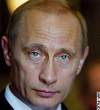Putin touches the pawn and wins: Putin to become Russian PM?

Vladimir Putin has confounded all predictions by saying he would head United Russia’s federal list at the State Duma elections in December, and might become prime minister in 2008.
This has created a funny, dramatic and paradoxical state of affairs.
The grand scale of United Russia’s congress should not deceive anyone. In Soviet times, vacationers loved to play man-sized chess, where even the pawns were giants. But whatever its size, a pawn’s freedom to maneuver is limited, and it is helpless without defense.
Everyone knows that the success of the pro-Kremlin party depends on the president, which explains its happiness at Putin’s agreement to head its list. United Russia’s victory in the December parliamentary elections is now assured, and the position of its rival, Fair Russia, headed by upper house speaker Sergei Mironov, has been irrevocably undermined.
The other winner is Putin himself. First, he has reinforced his standing for the time he will spend outside the Kremlin. And second, the promise to become prime minister if an “efficient” person is elected president means that Putin will be free to choose the successor he wants.
The people love Putin and will vote for anyone he describes as “efficient,” which in this case means not very ambitious, as ambitions would be an unacceptable disadvantage for his successor.
I don’t believe the future Russian president would dare recommend that Prime Minister Putin resign. Given the people’s wholehearted support for Putin and a tame parliament, this would be political suicide.
And then, the next presidential elections, in 2012, are not that far away.
As to the drama in the situation, current events show that the mechanism of a formal democracy has been created and commissioned in Russia. All basic laws are respected, yet democracy is dwindling. Officially, we have a multiparty system, but in fact we are steadily moving towards a one-party structure, or rather the pseudo-democracy that once existed in some socialist countries.
And lastly, the paradoxical element: I am sure that the majority of Russians sighed with relief when Putin said he could become prime minister in 2008. They view this as a guarantee of stability and continuation of Russia’s current policy. Their feelings are quite sincere, though spin-doctors are working hard to keep them warm.
Russia is apathetic, and so sees only what it wants to see. It will not break out of this state soon. The trouble, though, is that fat years can give way to lean ones, and the currently justified strengthening of the armed forces could lead to an arms race. Mind you, I don’t want to sound too pessimistic.
If all of these problems materialize, nobody will be able to deal with them under the conditions of a formal democracy. We have not learned to foresee the situation several moves ahead. In fact, we are playing not chess, but bingo.

